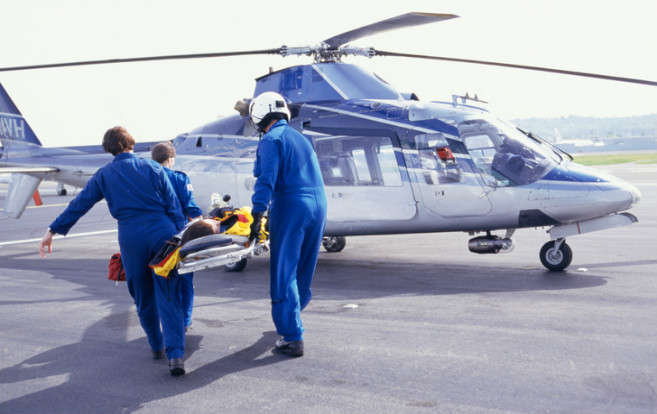Disaster Relief Nursing: Travel Nurse Jobs in a Crisis

By Melissa Wirkus, Contributor
The working conditions may be less than ideal and the patient care demanding, but for some nurses, working in disaster response situations brings the utmost satisfaction to a career already dedicated to helping others.
From providing aid during Southern hurricanes to lending their clinical skills at New York City’s Ground Zero after the terrorist attacks of September 11, 2001, nurses from all across the country have taken their travel nursing career to the next level by accepting assignments in disaster and crisis response situations.
Even as staff and travel
nurses continue to respond to the areas affected by Hurricanes Harvey and Irma
in 2017, we can get a glimpse at what they are experiencing, from others who
have been there:
RNs to the Rescue: Travel Nursing Opportunities in Disaster Response
Connie Ramos, an ICU nurse who travels with the quick-start, short-term travel nursing agency NurseChoice, had over 30 years of nursing experience before she decided to embark on a career as a travel nurse.
With one assignment under her belt, Ramos was soon called upon to work at Ben Taub General Hospital in Houston shortly after Hurricane Ike made its final landfall, leaving behind a wake of destruction.
“I received a call from my recruiter that they needed nurses to come help out at a hospital in Houston that was affected by the hurricane,” Ramos explained.
Shortly after receiving that call, Ramos was on her way to help out in Ben Taub’s ICU, which was inundated with patients and lacking enough health care professionals.
“We had a lot of patients that were coming from different facilities because they couldn’t get to their regular medical center,” Ramos explained. “I worked in the ICU almost the whole time which was great for continuity of care. Of course, whenever another unit needed help, our team would go and assist.”
The camaraderie among the nursing staff and the high level of preparation and facilitation from the management team impressed Ramos, especially during this time of increased stress and uncertainty.
“Overall it was a really great experience,” she said. “We instantly became a big family. All of the nurses really came together and there was good communication from the hospital administration.”
Working in a disaster response situation allows a nurse to test his or her clinical skill set and personal composure under intense pressure, including some level of sleep deprivation. Although NurseChoice provides temporary housing to nurses on every assignment, sometimes working in a crisis situation makes it difficult for the nurses to even leave their facility.
“During the three days I was there we slept in the recovery room or the EKG room,” she explained. “Although we were sometimes on a shift from 12-14 hours they really treated us great. We had regularly scheduled meals and the continuity of patient care was excellent.”
Sesselja Cody, a placement consultant with NurseChoice, said that although the disaster response assignments are the same on many levels as regular short-term rapid response assignments, they can vary widely in response times and living conditions due to the uncertainty of the situations.
“The conditions that the nurse is working or living in may be very different depending on the situation and severity of the disaster or crisis,” Cody explained. “An example is that housing could even be provided in the hospital itself due to the conditions of the area and arrival time may be within 24 hours. The length of the assignment may be from three days (72 hours straight) or as long as six months, as was the case with Hurricane Katrina. It often depends on the severity of the disaster and the community’s ability to get back on its feet.”
NurseChoice specializes in rapid response travel nursing assignments that usually last anywhere from two to eight weeks. Due to the quick-start nature of the assignments and NurseChoice’s professional relationship with thousands of facilities across the country, disaster response assignments have become part of the job opportunities available with the agency.
“NurseChoice is wonderful. They have been very flexible with my assignments and the continuing education is great,” Ramos said.
Nurses interested in working disaster response travel nursing assignments should have all of their paperwork, certifications and credentials on file and up-to-date so they can be called upon to work at a moment’s notice.
“Be prepared with current immunizations, licensure, certifications, references and everything else you would need for a travel assignment,” Cody said. “Make sure NurseChoice knows you’re available and interested in working these types of assignments. Also, remember that states will still require you to have the appropriate licensure to work as nurse in that state, even for disaster relief.”
In addition to giving experienced nurses the chance to help others in need, disaster response assignments can also help nurses gain valuable clinical skills and experience that will help them to grow in their career.
“It’s the ultimate opportunity to help,” Cody said. “Most RNs are drawn to this field because they want and like to help. The volume of responses we receive shows how much nurses want to help other communities in these situations.”
For more information about disaster response opportunities, contact NurseChoice.
This article was originally published in 2009 on TravelNursing.com and has been updated as of November 2018.